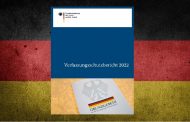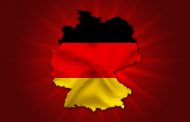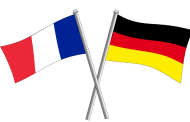Nemecký minister zahraničných vecí H. Maas predniesol príhovor na výročnom stretnutí veľvyslancov Írska. Maas uviedol, že brexit nesmie viesť k tvrdej hranici medzi Írskom a Severným Írskom a že konflikt, ktorý bol ukončený dohodou na Veľký piatok, sa nesmie obnoviť. Okrem iného minister Maas hovoril o hlavných výzvach pre EÚ, medzi ktoré zaradil: vyvážené transatlantické partnerstvo; zvládnutie hospodárskych a politických ambícií Číny; európsku politiku voči Afrike. Taktiež povedal, že únia potrebuje novú východnú politiku, ktorá zohľadní záujmy všetkých členských štátov, ale zároveň umožní Európskej únii uplatniť svoj vplyv na východných susedov.
* * *
Address by Foreign Minister Heiko Maas on the occasion of the Meeting of Ireland’s Ambassadors and Consuls General
_____________________________________________________________________________________________________________________________________
Thank you, Simon, for the warm welcome! Go raibh maith agat!
I heard that there is a saying in Ireland: “Broken Irish is better than clever English”. But my Irish is broken beyond repair – so I hope that you will forgive me for sticking to English.
When Simon invited me to come to Dublin and to speak here today, it reminded me of a little story I had heard about him.
You may know that, some 20 years ago, Simon and his family sailed around the world to raise money for victims of the Chernobyl disaster. One day, one of Simon’s brothers was celebrating his birthday on the boat. They were in the middle of the ocean. So Simon and his brothers figured that it was safe to send out a radio message, inviting other boat crews to join the Irish birthday party.
But they didn’t think about the effect that the message “party on the Irish boat” would have on German sailors.
Reportedly, Simon and his brothers were quite surprised when a German ship pulled up to join the celebration. And what was even more surprising: The Germans brought not only drinks, but also good music. The result was a great Irish-German party in the middle of the ocean.
So, when Simon invited me to join your Irish ambassadors’ party here today, I just had to accept.
Of course, ladies and gentlemen, I am here to celebrate the Irish-German friendship and 100 years of independent Irish diplomacy. But our meeting also signals European unity in challenging times.
The international seas we are navigating these days are rough:
Concerns over security in Europe are growing. As Russia violates the INF Treaty, a new arms race in Europe looms on the horizon.
The potential withdrawal of US troops from Syria raises serious questions about America’s role in global security.
Also – with the United Kingdom – a true global player will soon be leaving the European Union.
Brexit is less than three months away, and the final outcome is up in the air. Even a no-deal scenario is still an option – despite the serious damage that this would cause on both sides.
There is too much at stake to take this lightly. We urge our British friends to act responsibly and unite behind the agreement that we have spent so much time and effort negotiating.
I will leave it to the bookmakers and fortune-tellers to predict the results of discussions in London. However, there are three takeaways from the Brexit process and the current state of world affairs that I would like to share with you today.
The first is: We are strong when we stand together. During the Brexit negotiations, all 27 Member States agreed on a common position – and stood by it.
This unity includes full solidarity with Ireland. We insisted, and still do, that a hard border dividing the Irish island is unacceptable. And yes, some people called us stubborn.
But the truth is: Avoiding a hard border in Ireland is a fundamental concern. It is a matter of principle, a question of identity for the European Union. A union that, more than anything else, serves one purpose: To build and maintain peace in Europe.
As Germans, we understand how walls and borders can threaten peace. We believe in the peace-making power of European unity.
A belief we share with you, the Irish. Your Good Friday Agreement is living proof of this principle.
I hope that European unity will inspire us far beyond Brexit. It is in the spirit of unity that we can build a stronger and more sovereign Europe. But, to do so, we must make sure that Europe has answers to our long-term challenges:
- We need a joint commitment to invest in a more balanced transatlantic partnership.
- We need a strategy to handle the economic and political ambitions of China.
- We need an ambitious European policy towards our neighbours in Africa.
And we need a new European Ostpolitik. A policy that takes the interests of all Member States into account, but also allows the European Union to bring its influence to bear on its Eastern neighbours.
All of this will require a different approach to decision-making in Brussels. The Commission has proposed majority voting on issues of foreign and security policy. These proposals are useful and deserve strong follow-up.
Unity does not mean unanimity. A strong majority can be more effective than a weak consensus.
I am convinced that all Member States will benefit from more effective decision-making – no matter how large or small they are.
We should also focus on better implementation of EU foreign policy. The External Action Service is doing excellent work. But we need new instruments to improve coherence.
Some proposals are already underway. Take the implementation of PESCO projects. Take the strengthening of the civilian side of the Common Security and Defence Policy, with a new Centre of Excellence in Berlin. These are steps in the right direction. But more work needs to be done.
This includes giving the EU a budget for the future. A budget that focuses
- on research and innovation,
- on security for the citizens of Europe,
- on the proper management of migration,
- and on strong European foreign policy.
Ladies and gentlemen,
There is a second takeaway from Brexit and the current state of world affairs: We must not take our rules-based international order for granted.
A month ago, Secretary Pompeo said at a conference in Brussels that “multilateralism has too often become an end unto itself”. Only the nation-state, he added, can reassert sovereignty in a changing world.
I am not sure that this is true – even in the case of the United States. But I do know that it would be the wrong path for Europe.
In a world marked by great power competition, no single European country has the clout to defend its interests without partners.
For us Europeans, pooling sovereignty has never meant losing it. On the contrary: Pooling sovereignty enables us to win back influence that we have lost as nation-states.
Only if we Europeans learn to speak with one voice, will that voice be heard. And let me be clear: And this voice must reflect the diversity of all EU countries, large and small. We certainly need some good Irish “craic” in the mix.
An Irish friend once told me that Ireland only gained true sovereignty when it entered the European Union. I am not a historian, so I am not able to confirm that.
But today, you are discussing how to double Ireland’s “global footprint”. That footprint is also a result of Ireland’s European integration and its openness to the world.
For the Irish, nationalism does not mean “taking back control”, as the Brexiteers claim. In fact, nationalism means “losing control”. That should also be our message when we confront nationalists and populists in the next European elections this year.
International cooperation, a willingness to compromise and the acceptance of a common set of rules lie at the heart of our European success story. Multilateralism is in our DNA.
Therefore, the European Union must be the first to defend and reform the rules-based international order.
Let me give you some examples:
We know that free trade and commerce are the foundation of our prosperity. Therefore, we are working together to dissuade our American friends from new tariffs and trade barriers. But at the same time, we are seeking even closer cooperation with Washington and others to reform the WTO and to address valid concerns over unfair competition.
Our goal is a positive agenda for trade. The signing of the EU-Japan free-trade agreement was a great step in that regard. Reaching an agreement with Mercosur countries could soon be another.
And, ladies and gentlemen, we also need to strengthen the UN system. Germany has just taken a seat on the Security Council for two years. We want to be a strong voice for a rules-based international order, for peace and security. A voice for gender equality, arms control and the fight against poverty. In essence, a European voice.
Indeed, we would be delighted to hand over our seat to Ireland in 2021. Because we know that you share our commitment to multilateralism, pragmatism in the search for peace, and a passion for human rights. So, that is why we are glad to support your candidature.
As Europeans, we must be at the heart of an “Alliance for Multilateralism”. An alliance that already includes partners such as Canada, Japan and Australia, who share our goals and concerns.
Together, we aim to strengthen cooperation on issues such as climate change, protectionism, migration and arms control.
I would like to encourage all of you to support this initiative. As diplomats, you are best placed to identify new partners in Asia, Latin America or Africa. Please reach out to your host countries and spread the message: There is no better partner than Europe in the struggle for a rules-based international order.
Ladies and gentlemen,
My third takeaway from the Brexit process is: A strong Europe needs strong foundations. Brexit shook these foundations. We even worried about other countries following the UK’s example.
Fortunately, our foundations proved more solid than many of us had thought.
They are based on values like freedom, social justice, the rule of law, mutual respect and cooperation.
These values should not divide us, but rather bind us closer together. We have therefore proposed a new instrument: A peer-review mechanism that promotes a common understanding of European values, without any finger-pointing.
Last but not least, strong foundations require strong bilateral relations.
2019 marks the 90th anniversary of diplomatic ties between our two countries. In 1930, your first ambassador to Germany, Daniel Binchy, reported back to Dublin: “I think I may sum up German public opinion towards Ireland as one of uninformed sympathy.” That’s not bad.
Uninformed sympathy … I don’t know if you would still use those words today, Ambassador Collins.
But I can assure you that there is lots of sympathy. Many Germans feel passionate about Ireland – about its culture, its landscapes and especially its people.
And as you know, Simon, that group of fans includes me, already since my backpacking days here in Ireland.
Your colleagues in Berlin have even created a new way to describe this sympathy. In their review of Irish-German relations, they coined the term “affinity diaspora”.
The affinity diaspora harbors great potential for our bilateral relations. When I first visited Dublin in April of last year, Simon and I agreed to cooperate closer than ever. We decided to join efforts to keep Europe together. To make it work even better for the good of our citizens.
A few weeks ago, we adopted a “Joint Plan of Action”. You could also call it a German-Irish roadmap for the years to come.
It covers all sectors, from peace and crisis prevention to financial stability.
We will enhance joint research activities.
And we will foster bilateral exchanges to bring people from Ireland and Germany even closer together.
This is because we want to make sure that Ambassador Collins and Ambassador Potzel will report about “informed sympathy” in one of their next cables to Dublin and Berlin.
These bilateral efforts are also steps towards greater European unity. So, wherever you are posted in the world, let me encourage you to reach out to your German colleagues! I can promise you that every proposal is welcome – whether it is a German-Irish aid project in Africa or a joint initiative in Brussels, Geneva or New York.
Ladies and gentlemen,
When your Ambassador Binchy returned to Ireland in 1932, he published an essay in which he warned of a “return to the wilderness” across Europe. His words would prove all too true in the dark days and years that followed.
Many will say that his words ring like a warning bell today. But we are by no means without hope. A united Europe can prevent the wilderness from returning. And, in that struggle, Germany couldn’t wish for a better partner than Ireland.
There is no doubt that 2019 will be a challenging year. A year in which we will need friends and partners.
Friends who are willing to work with us for a strong and sovereign Europe.
Friends who will help us strengthen multilateralism.
Friends who believe in European values and cooperation.
In essence: Friends like Ireland.
Thank you, Simon – and thanks to all of you – for being that friend. And let me add: When seas get rough, don’t forget that a friendly German boat may be closer than you think.
Thank you very much!
* * * * *
Zdroj: https://www.auswaertiges-amt.de/en/newsroom/news/maas-ireland/2175542
lustračné foto: https://upload.wikimedia.org/wikipedia/commons/thumb/9/92/2017-03-26_Heiko_Maas_by_Sandro_Halank%E2%80%933.jpg/1024px-2017-03-26_Heiko_Maas_by_Sandro_Halank%E2%80%933.jpg







